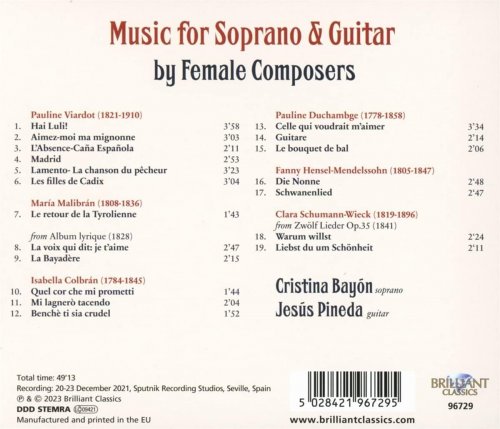
Cristina Bayón Álvarez - Music for Soprano & Guitar by Female Composers (2023) Hi-Res
BAND/ARTIST: Cristina Bayón Àlvarez, Jesús Pineda
- Title: Music for Soprano & Guitar by Female Composers
- Year Of Release: 2023
- Label: Brilliant Classics
- Genre: Classical
- Quality: FLAC (tracks) / FLAC 24 Bit (96 KHz / tracks)
- Total Time: 42:19 min
- Total Size: 181 / 738 MB
- WebSite: Album Preview

Tracklist:
01. 6 Mélodies et une havanaise: IV. Hai Luli! VWV 1106
02. 6 chansons du XVe siècle: I. Aimez-moi ma mignonne, VWV 1121
03. 10 Mélodies: III. L'Absence-Caña Española, VWV 1046
04. 6 Mélodies: V. Madrid, VWV 1136
05. Lamento: La chanson du pêcheur, VWV 1139
06. 6 Mélodies: VI. Les filles de Cadix, VWV 1135
07. Le retour de la Tyrolienne in B-Flat Major
08. La voix qui dit: je t'aime in A Major
09. La bayadère
10. 6 Petits airs italiens: XIV. Quel cor che mi prometti
11. 6 Petits airs italiens: XII. Mi lagnerò tacendo
12. 6 Petits airs italiens: III. Benchè ti sia crudel
13. Celle qui voudrait m'aimer
14. Guitare
15. Le bouquet de bal
16. 12 Lieder, Op. 9: I. Die None
17. 6 Lieder, Op. 1: I. Schwanenlied
18. 12 Lieder, Op. 35: I. Warum willst
19. 12 Lieder, Op. 35: II. Liebst du um Schönheit
The 19th century salon was a major vehicle for the spread of culture and the transmission of new artistic and literary trends in Europe, as well as being a space overtly dominated by women. Aiming to recreate the musical atmosphere of a 19th-century salon, this recording revolves around two fundamental objectives. The first, to perform music by women who, as composers, performers and hostesses, were absolute cornerstones of these spaces. Second, to perform the songs, originally accompanied by piano, with newly made guitar arrangements. The arrangements on this album have been made following a scrupulous transcription from the piano parts, retaining the harmonic essence whilst capturing the full polyphonic interplay. Several guitar effects have also been incorporated (tambora, harmonics, strumming, etc.), bringing a fresh twist to the original versions. All this contributes not only to expanding the guitar repertoire, but to the discovery of unfamiliar works.
Pauline Viardot (1821–1910) was born in Paris to a highly musical Spanish family and enjoyed an illustrious career as a singer. Returning to Paris in 1870, she established one of the most important musical salons of the time. Viardot’s songs have palpable Spanish roots, and her later pieces, like ‘Caña española’, were likely influenced by her father’s compositions. María Malibrán (1808–1836), Viardot’s elder sister, is most famous as an illustrious Spanish opera diva. Isabel Colbrán (1784/5–1845) was a Spanish opera singer and the first wife of composer Gioachino Rossini. In the early years of her career, she composed 24 short Italian arias which bear a certain Rossinian stamp. That said, as those arias were written before she met Rossini, it must be queried who influenced whom. Pauline Duchambge (1778–1858) is perhaps the least known of these composers, and this album showcases a number of her songs that have never previously been recorded. A pianist, singer and guitarist, Duchambge studied composition with Cherubini and Auber, mainly composing romances on idealised romantic or historical themes (for example, ‘Celle qui voudrait m’aimer’). Fanny Hensel (1805–1847) was the elder sister of Felix Mendelssohn. Although she received a thorough musical education, Fanny’s father barred her from publishing her compositions. Several of her songs were published under Felix’s name, including ‘Die Nonne’, but she later published the set containing ‘Schwanenlied’ under her married name. She hosted the so-called ‘Musical Sundays’, soirées attended by leading artists and intellectuals of the day, including Clara and Robert Schumann, Heine, Paganini and Gounod. The life of Clara Wieck (1819–1896) was demanding, given that she had to be the bread-winner for her eight children as a concert pianist, owing to her husband Robert Schumann’s mental illness. The two lieder on this album are from Clara and Robert’s jointly published Zwölf Lieder song cycle.
Pauline Viardot (1821–1910) was born in Paris to a highly musical Spanish family and enjoyed an illustrious career as a singer. Returning to Paris in 1870, she established one of the most important musical salons of the time. Viardot’s songs have palpable Spanish roots, and her later pieces, like ‘Caña española’, were likely influenced by her father’s compositions. María Malibrán (1808–1836), Viardot’s elder sister, is most famous as an illustrious Spanish opera diva. Isabel Colbrán (1784/5–1845) was a Spanish opera singer and the first wife of composer Gioachino Rossini. In the early years of her career, she composed 24 short Italian arias which bear a certain Rossinian stamp. That said, as those arias were written before she met Rossini, it must be queried who influenced whom. Pauline Duchambge (1778–1858) is perhaps the least known of these composers, and this album showcases a number of her songs that have never previously been recorded. A pianist, singer and guitarist, Duchambge studied composition with Cherubini and Auber, mainly composing romances on idealised romantic or historical themes (for example, ‘Celle qui voudrait m’aimer’). Fanny Hensel (1805–1847) was the elder sister of Felix Mendelssohn. Although she received a thorough musical education, Fanny’s father barred her from publishing her compositions. Several of her songs were published under Felix’s name, including ‘Die Nonne’, but she later published the set containing ‘Schwanenlied’ under her married name. She hosted the so-called ‘Musical Sundays’, soirées attended by leading artists and intellectuals of the day, including Clara and Robert Schumann, Heine, Paganini and Gounod. The life of Clara Wieck (1819–1896) was demanding, given that she had to be the bread-winner for her eight children as a concert pianist, owing to her husband Robert Schumann’s mental illness. The two lieder on this album are from Clara and Robert’s jointly published Zwölf Lieder song cycle.
Year 2023 | Classical | FLAC / APE | HD & Vinyl
As a ISRA.CLOUD's PREMIUM member you will have the following benefits:
- Unlimited high speed downloads
- Download directly without waiting time
- Unlimited parallel downloads
- Support for download accelerators
- No advertising
- Resume broken downloads


